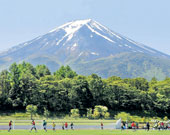 |
| On a high: Mt Fuji (above); Sunny (below left) and Mehak (below right) with Junko Tabei |
 |
Rain was the last thing Mehak Jaini and Sunny Wattal wanted to wake up to that August morning. On the previous night, the two college students from New Delhi, along with 58 others from 16 countries, had pitched camp at the base of Mt Fuji, the highest peak in Japan. About nine hours of good weather was all they needed to scale the 3,776 m that lay between them and the summit.
“Anyway, it wasn’t a tough climb,” says Jaini disdainfully, recalling the campaign over a round of soft drinks at a Delhi food court. “If only the weather hadn’t got in our way...”
On August 22, Wattal and Jaini ? students of Atma Ram Sanatan Dharma College and St Stephen’s College, respectively ? had left for Japan on a week-long camp organised by the Tokyo-based Himalayan Adventure Trust (HAT), headed by Junko Tabei, a Japanese national and the first woman to have scaled Mt Everest. The purpose of the camp was to ingrain in the minds of the young the concept of environmental clean-up operations. Mt Fuji was a case study ? it had been cleaned up by the HAT about two years ago. And the students were to study the process through which it had been cleaned, with the objective of initiating similar clean-up operations in their own countries.
Young though they were, Jaini and Wattal were no novices when it came to roughing it out in the open. Both came from adventure-loving families ? Jaini’s father, K.C. Jaini, had a paragliding business, while Ramesh Wattal, Wattal’s father, was associated with inbound tourism. Needless to say, both youngsters were born with trekking shoes on their feet. So while Wattal already knew the vast deserts of Ladakh and countless wildlife sanctuaries like the back of his palm, Jaini had armed herself with a basic mountaineering course from the Nehru Institute of Mountaineering, Uttarkashi.
So when the duo was chosen by the New Delhi-based Adventure Tour Operators of India (ATOI), a HAT partner, to represent the country at the camp, their excitement knew no bounds. For not only would it enhance their awareness about the environment but it would also give them a chance to scale Mt Fuji, all the more enigmatic since it happened to be a dormant volcano. And since they had to fight tooth and nail ? the selection procedure comprised an essay on environmental awareness ? with several other aspirants who were vying for the berths, they were determined to make the most of the trip.
“The camp began with an orientation session and a programme at the Yamanashi Institute of Environmental Studies,” says Wattal.
The first few days were spent either in classrooms or on field trips to forests managed by the Tokyo University and in caves formed by lava that emanated long ago from Mt Fuji. Vegetation management, afforestation and soil formation were other fields to which the team was introduced during those outings.
The weather had been fine till then. But on the morning the team was to break camp and head for the crater atop Mt Fuji, rain came down in spurts. Undaunted, the group moved on. But by the time they had reached the sixth station at 2,325 m, it had become impossible to continue on the trail. “It was too slippery,” says Jaini. “And things were worse for the two of us, since we weren’t carrying the right kind of rain gear.”
Drenched to their toes and with dampened spirits, the team headed down for the plains. Petty consolation followed in the form of a slide show of Mt Fuji, arranged by the organisers. Though it was far from the real experience, it was immensely educative, and Wattal explains why.
“In the old slides that were shown to us, we could see streams of tissue paper and other garbage strewn all over the slopes of the mountain,” he says. “The new slides had no trace of them. Moreover, on our way up, we saw lavatories which had been installed along the trail for climbers. We also learnt how the whole cleaning process was monitored.”
Now back in India, Wattal and Jaini want to share their experiences with a home audience, hoping that the model will be replicated in the Himalayas as well. And a seminar on environmental awareness, being planned by the ATOI sometime in December, might allow the duo to do just that and more. While Japan is still fresh in their memory, both Wattal and Jaini have got down to their academic involvements for the time being. Travelling, however, remains a passion for both. “And we hope we will be able to make work and play meet in the future,” says Wattal.
move mountains
To cut down on the consumption of conventional fuel, it’s best to use an improvised solar cooker on treks.
A kiwi bag ? used to collect and bring back garbage that one finds on one’s route in the wilderness ? can help keep the mountains clean.
Minimising the use of non-biodegradable products or products with a chemical base automatically reduces chances of polluting the environment.










